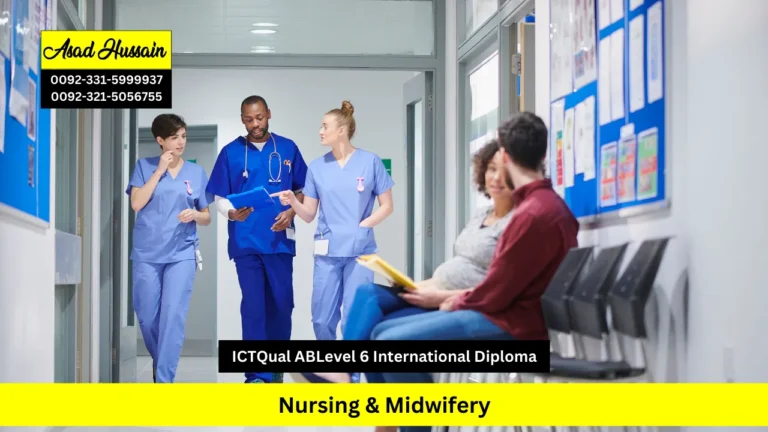The ICTQual International Level 3 Diploma in Airport, Airline and Aviation Management is a comprehensive qualification designed to prepare learners for supervisory and operational roles in the global aviation industry. Building on the knowledge gained from Level 1 and Level 2 awards, this diploma provides a deeper and broader understanding of airport operations, airline management, aviation safety, customer service, and regulatory compliance.
This program equips learners with the essential skills required to function effectively in airlines, airports, and aviation support services. Students gain valuable insights into airline scheduling, airport terminal management, aviation finance, human factors, and marketing strategies, ensuring they are well-prepared to meet the demands of a fast-paced and highly regulated industry.
The diploma is ideal for students, job seekers, and professionals who want to progress beyond entry-level positions and move into leadership roles. It is also suitable for career changers and international learners seeking a globally recognized qualification that enhances employability and opens doors to diverse opportunities in aviation. With flexible study options, learners can balance their education with work or other commitments.
Upon successful completion, graduates will hold a 30-credit, internationally respected qualification that not only strengthens their career prospects but also serves as a pathway to advanced studies, such as the ICTQual Level 7 Diploma in Airline and Airport Management. This makes the Level 3 Diploma a valuable stepping stone for anyone committed to building a long-term career in one of the world’s most dynamic and exciting industries.
Program Highlights
Mandatory Units
This qualification, the ICTQual International Level 3 Diploma in Airport, Airline and Aviation Management, consists of 6 mandatory units.
- Airline Operations and Scheduling
- Airport Terminal and Landside Management
- Aviation Safety and Emergency Procedures
- Human Factors and Teamwork in Aviation
- Aviation Marketing and Customer Relations
- Introduction to Aviation Finance and Resource Management
Entry Requirements for ICTQual International Level 3 Diploma in Airport, Airline and Aviation Management
Age Requirement
- Applicants must be at least 16 years old at the time of enrollment
- Open to both school leavers and adult learners interested in aviation careers
- No maximum age limit, making it accessible to learners of all backgrounds
Educational Background
- Completion of secondary school education (or equivalent) is recommended
- Learners who have completed the ICTQual Level 1 Award, Level 2 Award, or Level 3 Certificate in Airline, Airport, or Aviation Management—or an equivalent qualification—will benefit, though it is not mandatory
- Students with a strong interest in aviation, travel, or tourism are encouraged to apply
Work Experience
- No prior aviation work experience is required for this diploma
- Suitable for learners entering the industry for the first time
- Candidates with hospitality, logistics, or customer service experience may find the course especially valuable, as it builds on transferable skills
Language Competence
- A good command of spoken and written English is essential, as the course is delivered in English
- Learners should be able to communicate effectively in classroom or online discussions
- Some providers may require basic English proficiency tests to ensure readiness
Learning Outcomes for the ICTQual International Level 3 Diploma in Airport, Airline and Aviation Management:
Airline Operations and Scheduling
By the end of this unit, learners will be able to:
- Explain the principles of airline scheduling and route planning.
- Analyse factors influencing flight scheduling, including demand, aircraft availability, and regulatory constraints.
- Demonstrate understanding of fleet utilisation and turnaround management.
- Recognise the importance of punctuality and operational efficiency in airline performance.
- Apply basic problem‑solving to scheduling conflicts and disruptions.
- Understand the role of coordination between airline departments in maintaining schedules.
- Evaluate the impact of scheduling on customer satisfaction and profitability.
- Appreciate the use of technology and software in modern airline scheduling.
Airport Terminal and Landside Management
By the end of this unit, learners will be able to:
- Describe the functions of airport terminals and landside facilities.
- Analyse passenger flow management from check‑in to boarding.
- Demonstrate awareness of baggage handling systems and processes.
- Recognise the importance of landside services such as parking, transport, and retail.
- Apply knowledge of terminal design to enhance passenger experience.
- Understand the role of airport staff in ensuring smooth terminal operations.
- Evaluate the impact of congestion and delays on airport efficiency.
- Appreciate the balance between commercial development and passenger service in terminal management.
Aviation Safety and Emergency Procedures
By the end of this unit, learners will be able to:
- Identify international safety regulations and their application in aviation.
- Demonstrate awareness of safety management systems (SMS).
- Recognise common hazards and risks in aviation environments.
- Apply knowledge of emergency procedures for fire, evacuation, and medical incidents.
- Understand the role of staff in crisis management and passenger safety.
- Evaluate the importance of safety drills and training in aviation organisations.
- Explain the impact of non‑compliance on safety and reputation.
- Appreciate the link between safety culture and operational reliability.
Human Factors and Teamwork in Aviation
By the end of this unit, learners will be able to:
- Explain the concept of human factors in aviation safety and performance.
- Analyse the impact of fatigue, stress, and workload on aviation staff.
- Recognise the importance of communication and coordination in aviation teams.
- Apply teamwork principles to operational scenarios.
- Understand the role of leadership in motivating and guiding aviation staff.
- Evaluate strategies for reducing human error in aviation operations.
- Demonstrate awareness of cultural diversity in aviation teamwork.
- Appreciate the importance of continuous training in improving human performance.
Aviation Marketing and Customer Relations
By the end of this unit, learners will be able to:
- Explain the role of marketing in airline and airport competitiveness.
- Analyse customer needs and expectations in aviation services.
- Demonstrate awareness of branding, loyalty programmes, and promotional strategies.
- Apply principles of customer relationship management (CRM) in aviation.
- Recognise the importance of digital marketing and social media in aviation promotion.
- Evaluate strategies for improving passenger satisfaction and loyalty.
- Understand the link between customer service quality and business success.
- Appreciate the role of staff in maintaining positive customer relations.
Introduction to Aviation Finance and Resource Management
By the end of this unit, learners will be able to:
- Explain the basics of aviation finance, including revenue and cost structures.
- Analyse key sources of airline and airport income.
- Demonstrate awareness of budgeting and resource allocation in aviation.
- Recognise the importance of cost control and efficiency in aviation operations.
- Apply basic financial concepts to decision‑making in aviation contexts.
- Understand the role of financial planning in long‑term sustainability.
- Evaluate the impact of economic factors on aviation profitability.
- Appreciate the importance of resource management in maintaining operational efficiency.
The ICTQual International Level 3 Diploma in Airport, Airline and Aviation Management is designed for learners who want to progress into supervisory and operational roles within the aviation sector. This diploma is ideal for students, job seekers, career changers, and professionals who are passionate about aviation and want to gain a globally recognized qualification that enhances employability and career growth.
Students and School Leavers
- Learners completing secondary education who want to specialize in aviation
- Students progressing from Level 1, Level 2, or Level 3 Certificate qualifications
- Young learners interested in airport, airline, or aviation management careers
- Those preparing for higher-level aviation studies or diplomas
- Students seeking a globally recognized qualification to boost employability
- Individuals passionate about aviation and eager to gain structured knowledge
Aspiring Airline and Airport Professionals
- Candidates preparing for roles in ground operations, passenger handling, or cabin crew
- Learners aiming for supervisory positions in airline or airport services
- Individuals who want to understand aviation safety, compliance, and regulations
- Those interested in customer service and passenger experience management
- People seeking international career opportunities in airlines and airports
- Beginners who want to transition into professional aviation roles
Travel and Tourism Learners
- Students enrolled in travel and tourism programs who want to expand into aviation
- Learners aiming to combine tourism knowledge with airline and airport operations
- Individuals preparing for careers in ticketing, reservations, or travel consultancy
- Tourism students seeking a competitive edge in the global job market
- Professionals in hospitality who want to diversify into aviation services
- Learners interested in international travel and aviation careers
Job Seekers and Career Starters
- Individuals looking for their first professional role in aviation management
- Job seekers aiming to strengthen their CV with a recognized qualification
- Candidates preparing for airline or airport recruitment processes
- Learners seeking practical skills for supervisory or customer-facing roles
- People interested in working in fast-paced airport environments
- Those eager to join one of the world’s fastest-growing industries
Career Changers
- Professionals from hospitality, logistics, or customer service moving into aviation
- Individuals with transferable skills who want to re-skill for aviation careers
- Workers seeking a new career path in a dynamic and global industry
- Mid-career professionals aiming to progress into supervisory roles
- People passionate about aviation but lacking formal qualifications
- Learners exploring aviation as a second career option
International Learners
- Students from around the world seeking a globally recognized qualification
- Learners aiming to work with international airlines and airports
- Expats preparing for aviation roles abroad
- Candidates interested in cross-cultural airline and airport operations
- Individuals seeking a qualification accepted by global aviation employers
- Learners wanting to understand international aviation standards
Aviation Enthusiasts and Future Leaders
- Individuals passionate about aviation who want to formalize their knowledge
- Learners curious about how airports and airlines are managed at a higher level
- People interested in aviation safety, compliance, and passenger experience
- Enthusiasts preparing for advanced aviation studies or management diplomas
- Those who dream of leadership roles in airlines or airports
- Learners motivated to turn their passion into a professional aviation career







